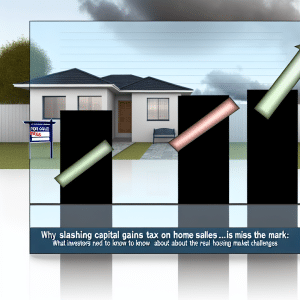Is the Capital Gains Tax on Home Sales About to Shift the Housing Market? What Investors Need to Know Now
The buzz in real estate circles is growing louder: President Donald Trump recently floated the idea of ending or significantly altering the capital gains tax on home sales—a tax that has remained largely unchanged for about 30 years. This potential policy change could be a game-changer for the housing market, but the implications are far from straightforward. At Extreme Investor Network, we’re digging deeper to uncover what this means for investors, homeowners, and advisors alike.
The Current Landscape: Who’s Really Impacted?
The National Association of Realtors (NAR) estimates that about 15% of current homeowners would face capital gains tax if they sold their homes in today’s market. This tax applies to profits exceeding $250,000 for individuals and $500,000 for couples, calculated on the difference between the purchase price and the sale price minus any improvements.
Lawrence Yun, NAR’s chief economist, highlights a key friction point: many homeowners, especially retirees looking to downsize, are holding back on selling because their accountants advise against it due to the looming tax bill. This “lock-in effect” restricts inventory, which in turn dampens market fluidity.
But here’s the kicker: most of those affected are in the higher-end market. With the median home price hitting $435,300 in June and 17% of homes sold priced above $750,000, it’s clear that the tax bites hardest at the top tier of the market. Lower and mid-tier homeowners generally don’t exceed the exemption threshold.
What Experts Are Saying—and What They’re Missing
Stephen Kim, a housing analyst at Evercore ISI, argues that the capital gains tax isn’t the real bottleneck. Instead, he points to the broader climate of uncertainty created by recent political and economic actions as the main culprit suppressing buyer confidence. After all, buying a home is often the largest financial commitment people make, and uncertainty breeds hesitation.
Meanwhile, Redfin’s Chief Economist Daryl Fairweather offers a contrarian view: cutting the capital gains tax might paradoxically reduce market activity. Why? Some homeowners sell just before hitting the taxable gain threshold, so removing that pressure could incentivize them to stay put longer, further tightening supply.
Fairweather also suggests a more targeted approach—lowering taxes on home improvements, like accessory dwelling units (ADUs), which can increase property values and provide rental income opportunities. This could stimulate investment in existing homes rather than just focusing on sales.
What This Means for Investors and Advisors
-
Watch for Policy Changes but Don’t Rely on Them Alone
While a capital gains tax overhaul could unlock some pent-up supply, it’s unlikely to be a silver bullet. Investors should prepare for a gradual shift rather than an immediate market surge. Stay informed on legislative developments and be ready to act when clarity emerges. -
Focus on Confidence and Stability
As Kim points out, confidence drives big-ticket purchases. Advisors should counsel clients to consider broader economic indicators and political stability when timing their real estate moves. Diversifying investments to hedge against uncertainty remains prudent. -
Explore Opportunities in Home Improvement and Value-Add
Following Fairweather’s insight, investors might find better returns by funding home upgrades that increase value and rental income potential rather than chasing quick flips. This strategy can also appeal to homeowners looking to boost their equity without selling. -
Consider the Demographic Shift
Baby boomers sitting on decades of home equity face significant tax implications if they sell now. Advisors should tailor strategies that factor in tax planning, potential downsizing, and estate considerations. For example, leveraging 1031 exchanges or gifting strategies might mitigate tax burdens.
A Unique Insight: The Hidden Impact on Secondary Markets
One trend we’re watching closely is how these tax dynamics could drive activity in secondary and vacation home markets. For instance, Gulf Shores, Alabama—a rising hotspot—has seen a surge in home sales, partly due to retirees seeking lifestyle changes. If capital gains tax relief encourages downsizing, we could see increased demand in such markets, offering savvy investors new avenues for growth.
What’s Next?
- Monitor Legislative Proposals: The capital gains tax debate is evolving. Investors should subscribe to updates from NAR, IRS announcements, and congressional hearings.
- Reassess Portfolio Risk: Given the political and economic uncertainty, now is a good time to review real estate exposure and diversify holdings.
- Educate Clients: Advisors must help clients understand the nuances of capital gains tax and how potential changes might affect their decisions.
Final Takeaway
Capital gains tax reform on home sales could be a catalyst for increased housing market activity—but only if coupled with greater economic stability and confidence. For investors and advisors, the smartest move is to stay agile, focus on long-term value creation through property improvements, and keep a close eye on policy shifts.
Sources: National Association of Realtors, CNBC, Evercore ISI, Redfin
At Extreme Investor Network, we’re committed to delivering insights that go beyond the headlines. Stay tuned as we continue to track how these tax discussions unfold and what they mean for your investment strategy.
Source: Why cutting capital gains tax on home sales wouldn’t solve housing issues

